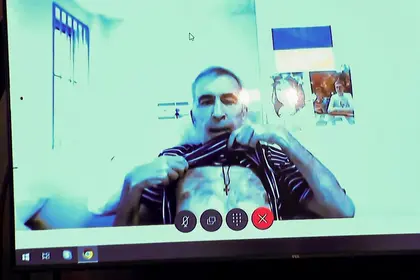During a court hearing shown on television Monday, July 3, a gaunt, almost emaciated Mikheil Saakashvili, the former leader of Georgia from 2004 to 2013, lifted his shirt to show his ribs protruding from his chest above a hollow abdomen.
The pro-Western reformer has been in custody since his return to Georgia from exile in Ukraine in 2021, when he was jailed on abuse of power charges that rights groups have denounced as politically motivated.
JOIN US ON TELEGRAM
Follow our coverage of the war on the @Kyivpost_official.
Clearly, the once robust leader is physically unwell. Anyone familiar with his situation, languishing in jail on corruption charges, can deduce that his condition is a direct consequence of his incarceration.
Ukrainian President Volodymyr Zelensky on Monday, July 3, asked the Georgian ambassador to Kyiv to return home and try to “save” Saakashvili – a Ukrainian citizen. “Today, I instructed the ministry of foreign affairs to summon the Georgian ambassador to Ukraine, to express our strong protest and to ask him to leave Ukraine within 48 hours to hold consultations with his capital,” Zelensky said on Twitter.
Zelensky wants Saakashvili – to whom he restored Ukrainian citizenship in 2019 – to be transferred to a clinic in Ukraine or the West.
Kyiv Post contacted the Georgian embassy in Kyiv to elaborate on Zelensky’s request, but they said flatly, “We will not comment.”
Regardless of whether the man is guilty, as his opponents in Georgia claim, or, as Saakashvili maintains, these are politically motivated charges against him that have been trumped up to keep him out of power, the case has by this point become a humanitarian issue.

Accept Trump and Get to Mars? No Deal.
Earlier this year Saakashvili urged Europe’s top rights court for help to receive medical treatment in Poland. Doctors said that the 55-year-old Saakashvili risked death from a number of conditions he had developed in custody.
In March, an EU diplomat confirmed to AFP that a decision had been taken to allow Polish doctors to examine Saakashvili, but the plan did not materialize.
Georgia’s Justice Minister Rati Bregadze said Saakashvili’s lawyers had failed to submit a formal request, a claim they deny.
AFP also reported that the council of doctors set up by Georgia’s rights ombudsman had said it was “impossible to treat Saakashvili in Georgia and the decision is to be taken to send him for treatment abroad.”
US-based doctors said Saakashvili’s health had deteriorated as a result of “torture” in custody. US toxicologist David Smith said in 2022 that tests had revealed Saakashvili had been exposed to poisoning by heavy metals while in prison.
The US, the EU and international rights groups have expressed concerns over Saakashvili’s reported mistreatment in custody and denounced his prosecution on allegedly political grounds.
Whatever the grounds for his detention, it becomes clearer by the day that Saakashvili is being subjected to “cruel and unusual punishment,” to use the wording of the English Bill of Rights of 1689, which was subsequently adopted by the authors of the US Constitution.
The current leaders of Georgia have left the rest of the world scratching their heads as they seem to condone – or at least ignore – the crimes of Russia, a country that invaded Georgia in 2008 and currently occupies 20 percent of its territory. Undoubtedly Georgia’s pro-Russian stance has a complex genealogy, but the result is fairly straightforward: Georgia is gradually following Russia into the zone normally reserved for pariah states.
To counter this slippery slope, a simple gesture of good will would go far – at least in the eyes of the international community that holds human rights as sacrosanct. Allowing Saakashvili to at least leave the country and get medical treatment would be a fitting gesture to assert Georgia’s respect for human rights and its desire to be a worthy member of the family of nations.
You can also highlight the text and press Ctrl + Enter






